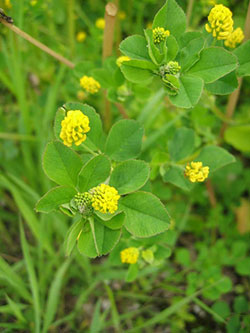How can I prevent leguminous weeds?

Wet, cool springs and early summers promote prolific growth of two legume family weeds in lawns, white clover (white flowers) and black medic (yellow flowers). Leguminous weeds can be both common and competitive in lawns that have not been fertilized adequately with nitrogen for a couple of years. Regular fertilization, especially late season (September-early November) nitrogen applications, can help reduce these weeds. Summer herbicide treatments aren’t as effective as fall applications, but enough control can be realized to justify professional sprays.
To maximize weed control and prevent turf injury, follow these guidelines:
- Ensure that the lawn is well-watered and not under stress.
- Don’t apply broadleaf herbicides when temperatures are above 85 F. Control may be reduced, turf may be injured, and the herbicide is more likely to volatilize and harm non-target plants at high temperatures.
What products are good to use for these weeds?
Spot treatment is preferable to broadcast applications with any post-emergent herbicide because of the lessened potential for harming non-target plants in the landscape. Post emergent herbicides such as Bayer Advanced All-In-One Lawn Weed & Crabgrass Killer, Ortho® Weed B Gon MAX® Plus Crabgrass Control, Spectracide® Weed Stop® for Lawns Concentrate plus Crabgrass Killer provide rapid and effective control of clover and other leguminous weeds. On non-residential lawns and golf courses, products containing clopyralid (Confront, Millenium) provide excellent control. Three-way herbicides containing dicamba and MCPP/MCPA (Trimec products, Speed Zone, Power Zone, Surge, Q4) can also provide good control of clover and black medic.
As always, an adequately fertilized, dense, healthy lawn is the best preventative against weeds.


